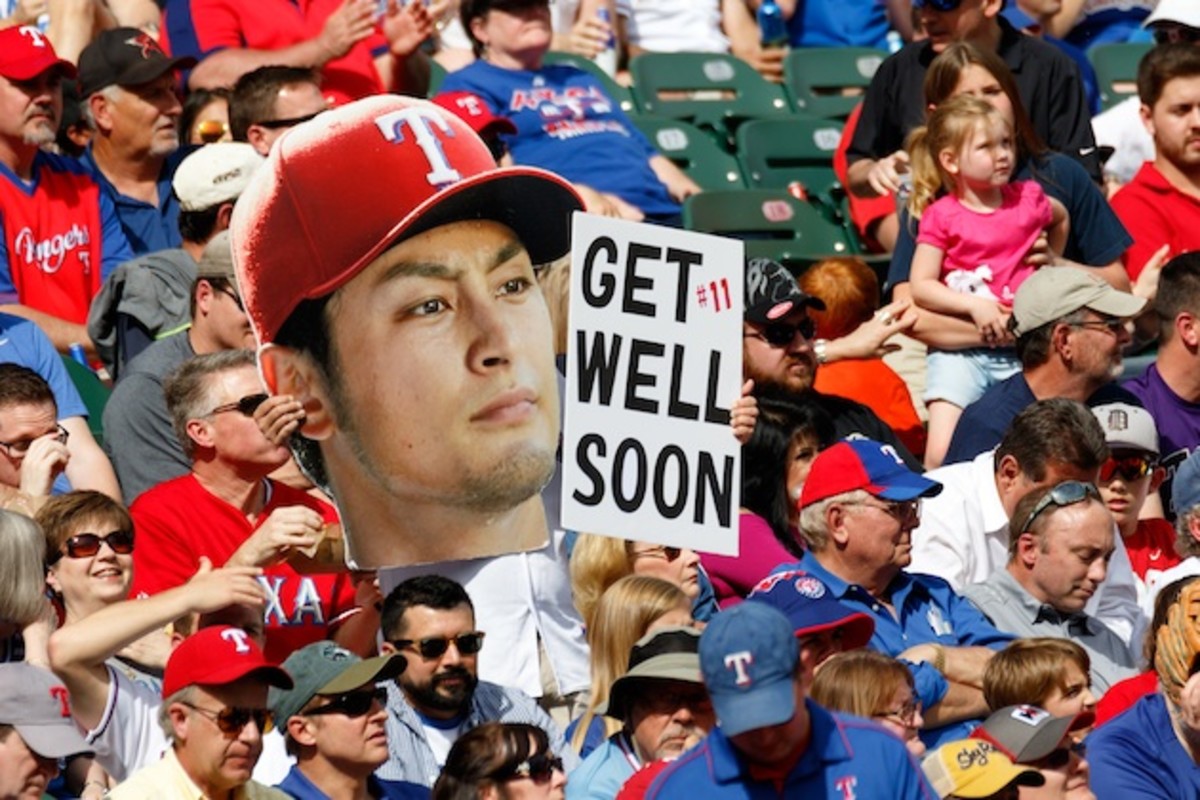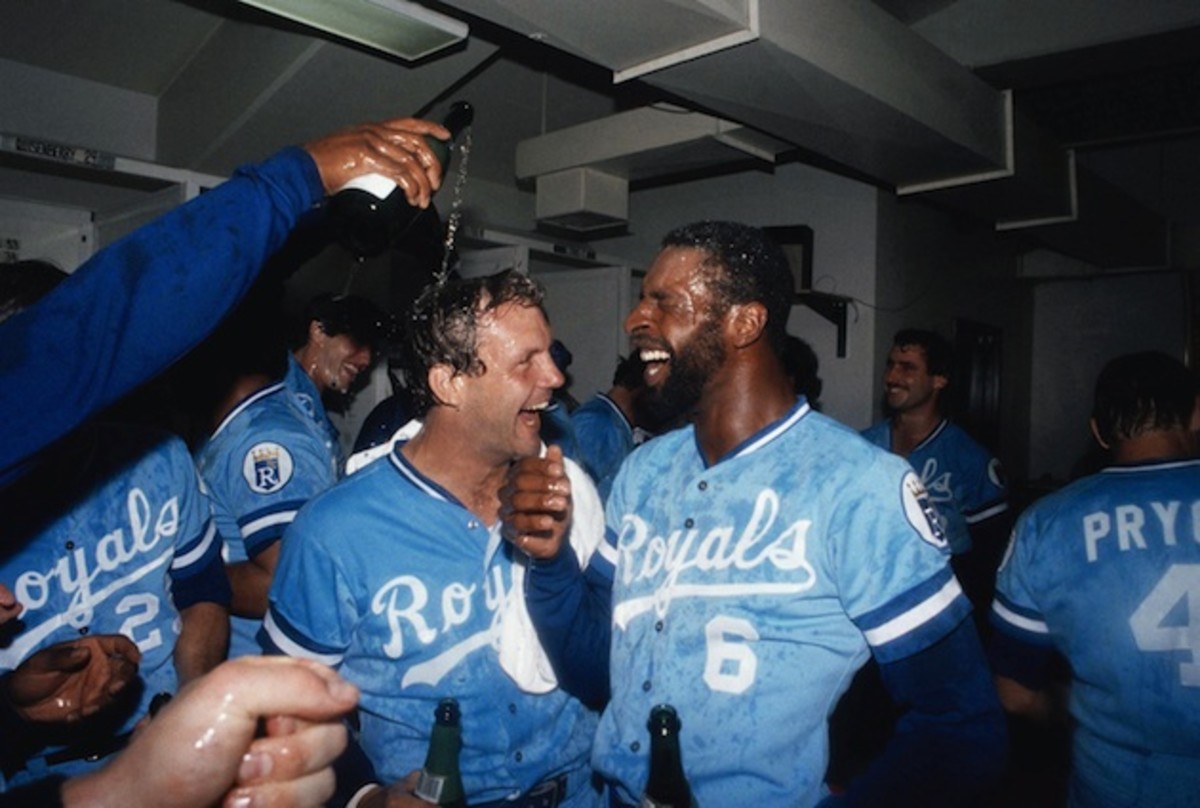Late-season push would put Rangers in exclusive playoff company

The sudden rise of the Houston Astros, from the depths of three straight 100-loss seasons to 2015 playoff contender, has led many to label them as the biggest surprise in the majors this season. In reality, they may not even be the unlikeliest playoff team in their own state.
When the Texas Rangers rocketed to the top of the American League West standings last week, buoyed by a dominant four-game sweep of the formerly division-leading Astros, the boys from North Texas completed one of the most stunning in-season turnarounds in recent memory. After never having spent a day alone atop the standings before last Tuesday night, the Rangers had taken control of the race and cemented themselves as the team to beat in the division.
It’s a rare thing for a team to take over sole possession of the division lead this late in the season. In fact, in the past 30 years, only three teams have managed to summit the division for the first time in the 144th game or later: the 2006 Twins and 2012 Athletics both did it on the last day of the season, while the 2007 Phillies finally captured the lead after game 160.
• MORE: Full postseason odds, standings and magic numbers
Regardless of how the division race finishes, the Rangers — following a disastrous April, and a seemingly insurmountable division deficit as recently as two months ago — are in a position no one could have predicted.

This team began 2015 looking every bit the 95-loss wreck of a season ago. After losing ace Yu Darvish to Tommy John surgery during spring training, the season looked over before the regular season had begun. Following an 8–16 start, first-year manager Jeff Banister wouldn’t let the team quit, and by the end of May the Rangers had somehow surfaced above .500.
Then came a horrible run in late June and early July during which the Rangers dropped 15 of 20, giving them a 42–46 record at the All-Star break. Texas would bottom out a week later, when a crushing walk-off loss in Colorado on July 20 dropped its record to 43–49, nine games behind the division lead.
Since then, however, the Rangers have undergone a dramatic turnaround, with only the scorching-hot Blue Jays registering a better record in the AL over that span, and the remarkable transformation has been fueled by unexpected contributions from a variety of players.

Not surprisingly, the pitching staff received a much-needed boost from the trade-deadline additions of starter Cole Hamels and reliever Jake Diekman. Texas is 7–0 in Hamels’ last seven starts, while Diekman entered this week with a scintillating 1.86 ERA in his last 12 appearances. Meanwhile, the offense has been given a much needed spark by the revival of Shin-Soo Choo and the emergence of the 21-year-old Rougned Odor (with honorable mention going to the team’s August pick-up of onetime Ranger Mike Napoli). Choo leads the AL in on-base percentage since the break, while Odor has tallied the highest second-half slugging percentage among second baseman. For his part, Napoli has made an impact both on and off the field, thriving in a utility role and providing a ton of leadership in the clubhouse.
• MORE: Rangers move into top 10 in latest Power Rankings
Should the Rangers hold on and reach the playoffs, they’d be reaching some rarefied air. Since the first All-Star Game in 1933, only three teams with a worse first-half win percentage than the Rangers (.477) have qualified for the playoffs in a non-strike season: the 1973 Mets (.452), 2003 Twins (.473) and 1984 Royals (.476). The Rangers haven’t punched their ticket just yet, but they’ve certainly established themselves as a viable postseason contender down the stretch. Here’s a brief look at the company the Rangers would be joining if their unlikely playoff push became reality:
1984 Royals (first-half record: 39–43)

Like this year’s Rangers, the Royals also were coming off a disappointing campaign. They had finished under .500 for the first time in nearly a decade the season prior, and authored a mediocre April run (8–11). The team never was able to build consistent momentum during the season, as every positive stretch seemed to be countered by a similarly poor one. Despite notching a losing record through 137 games, the Royals somehow hung around on the periphery of the AL West race before finally taking advantage of a pair of September collapses (by the Twins and Angels) to win their fifth division title in nine years.
Houston Astros defy convention in pursuit of playoff spot; more notes
The parallels between the ‘84 Royals and this year’s Rangers extend beyond their comparable slow starts. Kansas City also had been crippled by the loss of key players, with its three best hitters (George Brett, Willie Wilson, Frank White) all missing extensive time due to injury or suspension. The team also was forced to go with a revamped rotation for much of the season — a platoon that included a few rookies and only one holdover from the previous season.
After sneaking into the postseason, however, the Royals’ time in the spotlight was brief: They were swept in the ALCS by the Tigers, which went on to win the World Series over the Padres less than two weeks later.
2003 Twins (first-half record: 44–49)
After winning its first three games, Minnesota dropped six straight. Another six-game win streak followed, before the team proceeded to lose six more in a row. Although the Twins would rebound to win 31 games in May and June combined, they hardly looked like a playoff team at the midpoint of the season. Not only did they enter the break at 44–49 (7 1/2 games back in the division); they also were mired in yet another slump, having dropped eight straight and 12 of their last 13.
However, Minnesota quickly broke out of that mid-season funk, winning their first five post-break games en route to a surprising 46–23 second-half record. The Twins remained locked in a tight division race with the Royals and White Sox through most of August before finally taking control with an 11-game, division-clinching winning streak from Sept. 13–24. One of the keys to Minnesota’s second-half resurgence was a mid-July trade for outfielder Shannon Stewart, who hit .322/.384/.470 in 65 games with the Twins down the stretch.
Sadly, their Cinderella run was not to be: By winning a weak AL Central with a 90–72 record, the Twins were matched in the Division Series with the 101-win Yankees. The eventual AL champs would dispatch Minnesota in four games.
1973 Mets (first-half record: 42–51)

Four years after the miracle of 1969, the Amazin's made another incredible late-season push to win their second NL East title. It wasn’t supposed to be that hard: after winning their first four games and ending April in a first-place tie with the Cubs, the Mets looked every bit a legit NL contender. Beset by a rash of injuries, though, their season quickly nose-dived, and by the end of June, the Mets found themselves in the division basement. New York would fall to as far as 12 1/2 games back on July 8 before it slowly starting to come back. Still, even by the end of August, the Mets were right where they’d been a full month-and-a-half before, staring up at the rest of the division competition with just weeks left to play.
Remembering the great American life of Yankees legend Yogi Berra
That’s when Tug McGraw, the team’s gregarious closer, delivered his famous “Ya Gotta Believe!” rallying cry, sparking an unprecedented September charge to the top of the standings. After a crushing walk-off loss against the Cardinals on August 30 had dropped them into last place (at 61–71 and 6 1/2 back), the Mets went on to win 16 of their next 22 games before taking over sole possession of first on September 21 — a lead which they’d never concede. As for McGraw, he was brilliant down the stretch, notching 10 saves with a 0.57 ERA over the final month of the season.
The Mets entered the postseason on a high note, riding that momentum to a shocking NLCS upset of the 99-win, NL West champion Reds, which had been heavily favored to reach the Fall Classic. The Mets’ staggering run ended in heart-breaking fashion, though, as they came one victory short of another unlikely title, losing the World Series in seven games to the A’s.

